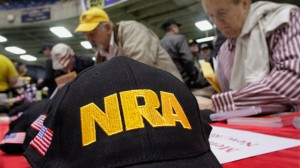One of the common themes that’s emerged in media discussion on the Aurora movie theater shooting last week is that this tragedy won’t be politicized — but that it should be. Michael Grunwold at Time writes:
The telegenic schoolmarms we call pundits are all denouncing the politicization of the tragedy in Aurora, calling out the crass opportunists who would dare to use human suffering to advance their preferred public policy choices. I feel terrible about what happened in that movie theater, and I’m agnostic about gun control, but there is nothing wrong with politicizing tragedy….
“If advocates or experts or even politicians think their policy ideas can prevent the next Aurora — by preventing potential killers from obtaining guns, by making sure potential victims can carry guns, or by some other method — then by all means, now is the time to spread the word.
Federal attempts to regulate guns have essentially frozen, thanks in part to the largesse and Congressional ratings system the National Rifle Association (NRA) uses to bait and punish lawmakers on Capitol Hill. The most significant national gun control legislative limit, the assault weapons ban, lapsed in 2004 and there’s virtually no support behind renewing it (Bloomberg points out one of the weapons purchased by James Holmes had been outlawed before 2004). No one seems swayed at all by the fact that states with stricter gun control laws have fewer deaths from gun violence.”
Just how much power do pro-gun advocates wield? A lot more than the other side. As Zaid Jilani writes at Republic Report, the anti-gun control lobby spent 17 times more than the pro-gun control lobby did last year, $4,212,996 to $240,000:
Last year, the NRA spent $2,905,000 lobbying Congress. The Brady Campaign spent $40,000. Michael Bloomberg’s pro-gun control Mayors Against Illegal Guns spent $200,000 and the anti-gun control Gun Owners of America spent $1,307,996.
But the NRA and its allies exert most of their influence on the state and local level, where much of the legislating (or lack thereof) on guns actually happens. Only 37,000 citizens living in the country’s most populous city (New York) have a permit to carry handguns on the street, compared to 18,000 Colorado residents who obtained such a permit in 2008 alone — and New York City has over 3 million more residents than the entire state of Colorado.

Illinois gun owners and supporters fill out NRA applications while participating in an Illinois Gun Owners Lobby Day convention Wednesday, March 7, 2012 in Springfield, Ill. (AP Photo/Seth Perlman)
State laws differ dramatically across the country when it comes to guns. But the NRA and its allies use similar tactics to make sure those laws are written in their favor. From 2000 to 2006, the NRA increased the number of its lobbyists who focus on state and local governments by a third and dramatically increased the number of phone calls and letters it directs to state legislators.
These tactics have been enormously successful. Concealed carry laws are just one example. According to The Los Angeles Times:
In 1981, for example, only two states allowed residents to easily obtain permits to tote concealed handguns in public, and only one required no permit. Now, in 35 states people can readily get concealed-carry permits, and four have no permit requirements.
Another state law endorsed by the NRA, Stand Your Ground, made headlines after the death of Trayvon Martin in Florida. Florida originally enacted the self-defense law in 2005; earlier this year it let Martin’s alleged killer, George Zimmerman, remain free until public pressure caused the state to further investigate and prosecute. Since 2005, 24 more states have adopted similar laws, most of which — like Florida’s — are modeled on legislation written by the NRA and the American Legislative Exchange Council (ALEC), the corporate group that helps push conservative model laws in statehouses across the country. There’s a long money trail behind this law specifically, the source being the NRA.
And while ALEC has been targeted by activists in the months since Martin’s death, losing much of its power and corporate sponsors, the NRA remains stronger than ever (conservatives even accuse it of throwing ALEC under the bus).
Equally strong, apparently, is America’s appetite for guns. In a widely reported statistic, gun sales in Colorado increased after the shooting there. One gun store employee told the Denver Post, “It’s been insane.”

